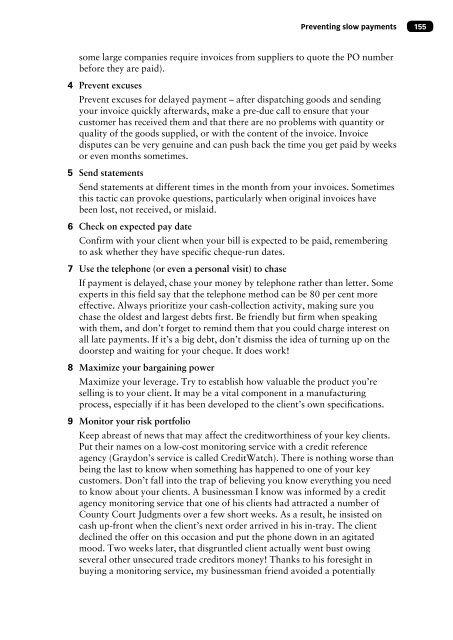The growing business handbook : inspiration and advice ... - Sparkler
The growing business handbook : inspiration and advice ... - Sparkler
The growing business handbook : inspiration and advice ... - Sparkler
You also want an ePaper? Increase the reach of your titles
YUMPU automatically turns print PDFs into web optimized ePapers that Google loves.
Preventing slow payments<br />
155<br />
some large companies require invoices from suppliers to quote the PO number<br />
before they are paid).<br />
4 Prevent excuses<br />
Prevent excuses for delayed payment – after dispatching goods <strong>and</strong> sending<br />
your invoice quickly afterwards, make a pre-due call to ensure that your<br />
customer has received them <strong>and</strong> that there are no problems with quantity or<br />
quality of the goods supplied, or with the content of the invoice. Invoice<br />
disputes can be very genuine <strong>and</strong> can push back the time you get paid by weeks<br />
or even months sometimes.<br />
5 Send statements<br />
Send statements at different times in the month from your invoices. Sometimes<br />
this tactic can provoke questions, particularly when original invoices have<br />
been lost, not received, or mislaid.<br />
6 Check on expected pay date<br />
Confirm with your client when your bill is expected to be paid, remembering<br />
to ask whether they have specific cheque-run dates.<br />
7 Use the telephone (or even a personal visit) to chase<br />
If payment is delayed, chase your money by telephone rather than letter. Some<br />
experts in this field say that the telephone method can be 80 per cent more<br />
effective. Always prioritize your cash-collection activity, making sure you<br />
chase the oldest <strong>and</strong> largest debts first. Be friendly but firm when speaking<br />
with them, <strong>and</strong> don’t forget to remind them that you could charge interest on<br />
all late payments. If it’s a big debt, don’t dismiss the idea of turning up on the<br />
doorstep <strong>and</strong> waiting for your cheque. It does work!<br />
8 Maximize your bargaining power<br />
Maximize your leverage. Try to establish how valuable the product you’re<br />
selling is to your client. It may be a vital component in a manufacturing<br />
process, especially if it has been developed to the client’s own specifications.<br />
9 Monitor your risk portfolio<br />
Keep abreast of news that may affect the creditworthiness of your key clients.<br />
Put their names on a low-cost monitoring service with a credit reference<br />
agency (Graydon’s service is called CreditWatch). <strong>The</strong>re is nothing worse than<br />
being the last to know when something has happened to one of your key<br />
customers. Don’t fall into the trap of believing you know everything you need<br />
to know about your clients. A <strong>business</strong>man I know was informed by a credit<br />
agency monitoring service that one of his clients had attracted a number of<br />
County Court Judgments over a few short weeks. As a result, he insisted on<br />
cash up-front when the client’s next order arrived in his in-tray. <strong>The</strong> client<br />
declined the offer on this occasion <strong>and</strong> put the phone down in an agitated<br />
mood. Two weeks later, that disgruntled client actually went bust owing<br />
several other unsecured trade creditors money! Thanks to his foresight in<br />
buying a monitoring service, my <strong>business</strong>man friend avoided a potentially








